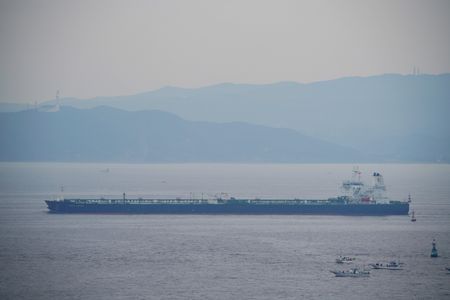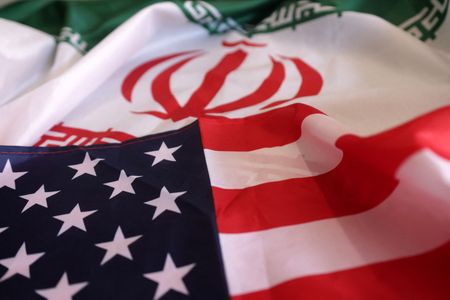By Jana Choukeir, Ahmed Elimam and Robert Harvey
DUBAI (Reuters) -Iran seized a tanker with Iraqi crude destined for Turkey on Thursday in retaliation for the confiscation last year of the same vessel and its oil by the U.S., Iranian state media reported, a move likely to stoke regional tensions.
The seizure of the Marshall Islands-flagged St Nikolas coincides with weeks of attacks by Yemen’s Iran-backed Houthi militias targeting Red Sea shipping routes.
“After the theft of Iranian oil by the United States last year, St Nikolas tanker was seized by Iran’s Navy this morning with a judicial order … it is en route to Iranian ports,” the semi-official Fars news agency reported, citing a statement by the Navy.
In Washington, the Pentagon said Iranian forces unlawfully boarded the St Nikolas in the Gulf of Oman and forced it to change course toward Iranian territorial waters.
The White House condemned the seizure.
“No justification whatsoever to seize it, none whatsoever. They need to let it go,” White House national security spokesperson John Kirby said.
The U.S. seized the St Nikolas last year in a sanctions enforcement operation when it sailed under a different name, Suez Rajan. Iran warned the U.S. the move would “not go unanswered”.
Armed intruders boarded the St Nikolas as it sailed close to the Omani city of Sohar, according to British maritime security firm Ambrey, and its AIS tracking system was turned off as it headed in the direction of the Iranian port of Bandar-e-Jask.
“Communication with the oil tanker, St Nikolas, under Marshall Islands flag and owned by the Greek shipowner Empire Navigation has been cut off around 06:30 on Jan. 11 in the waters of Oman,” Turkish oil refiner Tupras told Reuters in an emailed statement, confirming it had bought the cargo from Iraqi state marketer SOMO.
“The incident has no impact on our refinery operations,” the Turkish firm – which operates the 241,500 barrel per day (bpd) capacity Izmir refinery in Aliaga – added.
The ship loaded around 145,000 metric tonnes of oil in the Iraqi port of Basra and was heading to Aliaga in western Turkey via the Suez Canal, Empire Navigation told Reuters. It said it had lost contact with the vessel, manned by a crew of 19 including 18 Filipino nationals and one Greek national.
Since October, Yemen’s Houthis have attacked commercial vessels in the Red Sea to show support for Palestinian militant group Hamas in its fight against Israel. Those incidents have been concentrated on the Bab al-Mandab Strait, to the southwest of the Arabian Peninsula.
Thursday’s incident is located closer to the Strait of Hormuz, between Oman and Iran.
The United Kingdom Maritime Trade Operations (UKMTO) authority said earlier on Thursday it had received a report that a vessel around 50 nautical miles east of Oman’s coast was boarded by four to five armed persons.
The intruders reportedly were wearing military-style black uniforms and black masks.
The UK authority, which provides maritime security information, said it was unable to make further contact with the vessel and authorities were still investigating.
“Iran’s actions are contrary to international law and threaten maritime security and stability,” U.S. Navy’s Fifth Fleet Commander Vice Admiral Brad Cooper said in a statement.
The Suez Rajan was carrying more than 980,000 barrels of Iranian crude oil last year when it was seized and the oil confiscated in the U.S. sanctions enforcement operation.
The U.S. said at the time that Iran’s Islamic Revolutionary Guard Corps (IRGC) had been trying to send contraband Iranian oil to China, in violation of U.S. sanctions.
The vessel was unable to unload the Iranian crude for nearly 2-1/2 months over fears of secondary sanctions on vessels used to unload it. It was renamed the St Nikolas after unloading the cargoes.
(Reporting by Jana Choukeir, Ahmed Elimam, Parisa Hafezi, Elwely Elwelly and Robert Harveyin Dubai and Phil Stewart and Idrees Ali in Washington; Additional reporting by Andrew Mills in Doha, Eleftherios Papadimas in Athens and Enas Alashray in Cairo; Writing by Nadine Awadalla; Editing by Toby Chopra, Ros Russell, Susan Fenton, Andrew Heavens and David Gregorio)


